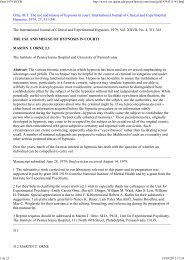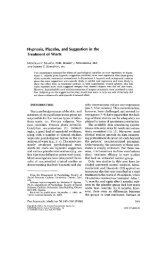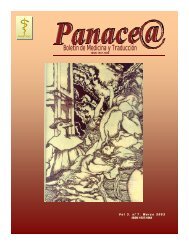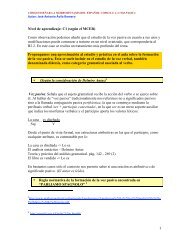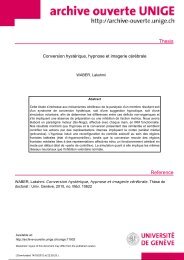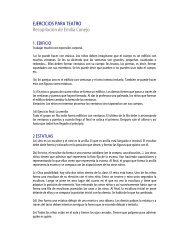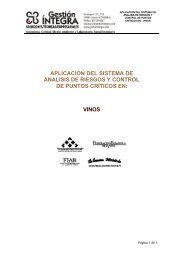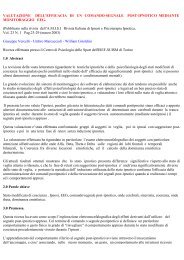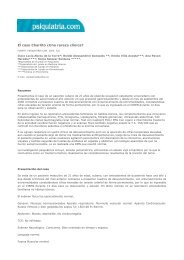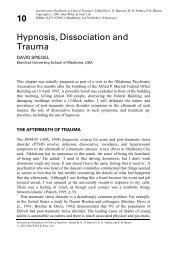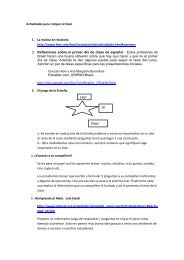Diccionario etimológico comparado de la lengua castellana
Diccionario etimológico comparado de la lengua castellana
Diccionario etimológico comparado de la lengua castellana
Create successful ePaper yourself
Turn your PDF publications into a flip-book with our unique Google optimized e-Paper software.
FORAS FORCÉ 2641<br />
foc-ere^ favorecer, proteger; fomes^fomitis^<br />
fomes, fómite; fo-mentum^ fomento;<br />
fo-ru-m (ont. fo-rus\ |)Iaza, p<strong>la</strong>zue<strong>la</strong>,<br />
mercado, lonja, lugar espacioso<br />
<strong>de</strong> los pueblos don<strong>de</strong> se ven<strong>de</strong>n varias<br />
cosas; foro, juzgado, tribunal para administrar<br />
justicia; prim. <strong>de</strong> foro y fuero<br />
(quod autem forum, id est, vestibulum<br />
sepulcri bustumve usucapí vetat, tuetur<br />
tus sepulcrorum. Haec habemus in XII.<br />
Cic. <strong>de</strong> leg. 2. 24. 61.); primitivos <strong>de</strong><br />
FOR-ERO, FOR-ILLO, FOR-AL y éstC <strong>de</strong><br />
foralmente; for-ensis^ -ense, perteneciente<br />
al foro, al tribunal, al juzgado;<br />
<strong>de</strong> don<strong>de</strong> for-ense, 1°. De for-as <strong>de</strong>scien<strong>de</strong>n:<br />
FOR-ENSE, 2";foj^-ín-secus, prim.<br />
<strong>de</strong> FOR-ÍN-SECo; for-áneo, for-año, forano;<br />
bajo-<strong>la</strong>t. /b/'-es¿a, prim. <strong>de</strong> floresta<br />
(cfr.), con epéntesis <strong>de</strong> <strong>la</strong> -/- sugerida<br />
por <strong>la</strong> pa<strong>la</strong>bra ^/¡or (cfr. italiano<br />
foresta; prov. foresta, foresí ; francés<br />
^orét; cñ\. floresta (=etimológ. que está<br />
fuera <strong>de</strong> pob<strong>la</strong>do) ; <strong>de</strong> don<strong>de</strong> forastero<br />
(=el que es <strong>de</strong> afuera, el que no<br />
es <strong>de</strong>l país); \{q\. forestiere; cal. foraster;<br />
port. forasteiro. (Estas voces /o-<br />
7'esta, forast-ero, etc., <strong>de</strong>rivan <strong>de</strong> un<br />
primitivo *for-estis, -este, el que es <strong>de</strong><br />
afuera, el que está fuera. De foresta<br />
<strong>de</strong>riva forest-al); suf-f-re {=sub-fire,<br />
por asimi<strong>la</strong>ción— cfr. sub-), sahumar,<br />
perfumar; fu-mu-s, primit. <strong>de</strong> fumo y<br />
HUMO (etimológic. que exha<strong>la</strong>, alienta,<br />
sahuma), <strong>de</strong> don<strong>de</strong> fum-ig-are (cfr. etim.<br />
<strong>de</strong> -ig- en ag-ir), primit. <strong>de</strong> fum ig-ar<br />
(=hacer humo); fum-iga-tio, -tion-is,<br />
-tion-em, prim. <strong>de</strong> fumiga-ción; /m-zi-ms,<br />
-eris, funeral, pompa fúnebre, solemnidad<br />
<strong>de</strong> un entierro, exequias, hoguera<br />
en que se quemaba el cadáver, etc.,<br />
(=elimológ. sahumadura, incensación,<br />
sufumigaciónj; <strong>de</strong> áonáefun-er-eus, -ea,<br />
-eum, prim. <strong>de</strong> funéreo; fune-bris, -bre,<br />
primit. <strong>de</strong> fúnebre; funer-arius, -aria,<br />
-arium, prim. <strong>de</strong> funer-ario; fun-estus,<br />
•ta, -tum, primitivo <strong>de</strong> fun-esto, etc.;<br />
foe-dus, -da, -dum, primit. <strong>de</strong> feo (por<br />
supresión <strong>de</strong> <strong>la</strong> -d-) y hedo (cfr. primit.<br />
foi-dus, foü-idus, foü-us, óe <strong>la</strong> raíz fov-,<br />
áe fou, amplificada <strong>de</strong> fu=dhu-); /oe¿ere,<br />
oler mal, prim. <strong>de</strong> fe<strong>de</strong>r y he<strong>de</strong>r<br />
f = exha<strong>la</strong>r mal olor, olor fuerte)<br />
^-mMs, -mr, excremento, estiércol, lodo;<br />
prim. <strong>de</strong> fimo (=que exha<strong>la</strong> mal olor,<br />
huele mal); tu-s, ó thus, thuris, incienso;<br />
prim. <strong>de</strong> TUR-I-BULUM, ó thur-i-bulum,<br />
;<br />
incensario; <strong>de</strong> don<strong>de</strong> tur-í-bulo; thuri-fer,<br />
-a, -um, (cfr. elimol. <strong>de</strong> -fer en<br />
fér-til), prim. <strong>de</strong> turí-fero, y éste <strong>de</strong><br />
turi-fer-arius, -aria, -arium, <strong>de</strong> don<strong>de</strong><br />
<strong>de</strong>scien<strong>de</strong> turifer-ario (=el que lleva<br />
el incienso), etc. Cfr. gót. daur, puerta,<br />
dauns, olor; ant. al. al. tor, puerta, toum,<br />
vapor; anglo-saj. du-s-t, polvo; inglés<br />
dust; hol. duist ; isl. dust ; dan. dyst,<br />
dunst; al. dunst, vapor, polvo fino ; esl.<br />
ecles. dveri, dcora, au<strong>la</strong>; dun-a-ti, so-<br />
p<strong>la</strong>r, exha<strong>la</strong>r olor; lit. dur-ys = fores,<br />
puerta. De foras <strong>de</strong>scien<strong>de</strong>n fuera y<br />
afuera. Cfr. ital. fuora y fuori; port.<br />
fora; prov. foras, fors; franc. hors, etc.<br />
Cfr. hedor, hediondo, fealdad,<br />
SIGN.— ant. fuera.— ant. fuera <strong>de</strong>.<br />
Forast-ero, era. adj.<br />
Cfr. etim. foras. Suf. -ero.<br />
SIGN.— 1. Que es ó viene <strong>de</strong> fuera <strong>de</strong>l<br />
lugar.<br />
2. Dícese <strong>de</strong> <strong>la</strong> persona que vive ó está en<br />
un lugar <strong>de</strong> don<strong>de</strong> no es vecina y en don<strong>de</strong><br />
no ha nacido. Ú. t. c. s.:<br />
Qaando entraron por <strong>la</strong> puerta <strong>de</strong>l templo unos forat<br />
teros. Cerv. Persil. lib. 8, cap. 5.<br />
3. fig. Extrañe, ajeno :<br />
Obe<strong>de</strong>ció al Tío. aunque con <strong>de</strong>sabrimiento, por juzgar<br />
su comisión forastera <strong>de</strong> sus estudios y <strong>de</strong> su in<br />
clinación. (¿uev. M. B.<br />
Forca. f.<br />
Cfr. etim. horca.<br />
SIGN.— 1. ant. horca.<br />
2. ant. HORQUILLA.<br />
Forc-ej-ar. n.<br />
Cfr. etim. forcejo. Suf. -ar.<br />
SIGN.— 1. Hacer fuerza para vencer alguna<br />
resistencia.<br />
2. fíg. Resistir, hacer oposición, contra<strong>de</strong>cir<br />
tenazmente<br />
:<br />
Forcejando mucho en esto todo aquel esquadrón <strong>de</strong><br />
espíritus malignos. 31. Agred. tom. 1, núm. 694.<br />
3. a. anU forzar, 3.* acep.<br />
Forc-ej-ear. n.<br />
Cfr. etim. forcejo. Suf. -ear.<br />
SIGN.— FORCE4ÍAR, 1.* y 2.' aceps.<br />
Forc-ejo. m.<br />
Cfr. etim. forza. Suf. -ejo.<br />
SIGN.— Acción <strong>de</strong> forcejear.<br />
Forcej-6n. m.<br />
Cfr. etim. forcejo. Suf.<br />
SIGN.— Esfuerzo violento.<br />
Forcej-udo, uda. adj.<br />
-ón.<br />
Cfr. etim. forcejo. Suf. -udo.<br />
SIGN.— Que tiene y hace mucha fuerza:<br />
Assi vivas <strong>de</strong> bogar pobre olvidada, T <strong>de</strong>stral forcé<br />
judo te perdone. Que me <strong>la</strong> vuelvas aunque mal parada<br />
Tercet. en a<strong>la</strong>b. M. S. J. In. tom. 3.



